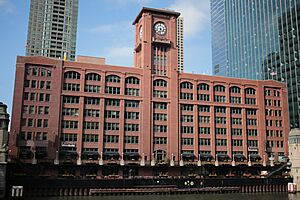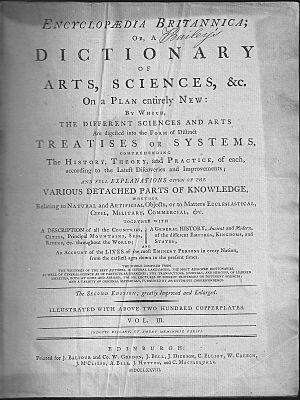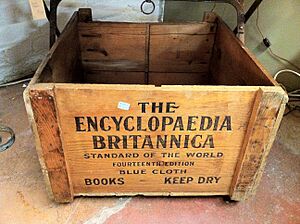Encyclopædia Britannica, Inc. facts for kids
 |
|
| Founded | 1768 Edinburgh, Scotland |
|---|---|
| Founder |
|
| Country of origin | Scotland |
| Headquarters location | Chicago, Illinois, U.S. |
| Key people |
|
| Imprints | Merriam-Webster |
| Owner(s) | Jacqui Safra |
Encyclopædia Britannica, Inc. is a company famous for publishing the Encyclopædia Britannica. This is the world's oldest encyclopedia that has been printed without stopping. The company also owns Merriam-Webster, which publishes American dictionaries. Encyclopædia Britannica, Inc. started in Edinburgh, Scotland. Even though it was originally British, its main office is now in Chicago, Illinois, in the United States.
Contents
The Story of Britannica
How Britannica Began
The company started in Edinburgh, Scotland, way back in the 1700s. This was during a time called the Scottish Enlightenment, when many new ideas were being explored.
Two people, Colin Macfarquhar and Andrew Bell, began the first edition of the encyclopedia in 1768. They hired William Smellie, who wrote most of the articles for that first book. The second edition came out in 1784. After Macfarquhar passed away in 1793, Bell became the only owner. He published the third and fourth editions.
Later, an Edinburgh publisher named Archibald Constable took over. He published the fifth and sixth editions. When Constable died in 1827, another company, A & C Black Ltd., bought the rights to the encyclopedia. They continued to publish it for the next 70 years.
Starting with the ninth edition in 1875, the encyclopedia began to cover many more topics. Experts from literature, social studies, and science helped write new articles. This ninth edition is still seen as one of the most amazing collections of knowledge ever made.
In 1901, Horace E. Hooper and Walter M. Jackson bought all the rights to the encyclopedia. They created companies in both the United States and England. Hugh Chisholm became the editor for the tenth, eleventh, and twelfth editions.
Sears Roebuck Takes Over
In 1915, a big store called Sears agreed to sell a new, cheaper version of the eleventh edition. This was made for everyday families. In 1920, Sears bought Britannica completely. But after only three years, Sears lost a lot of money on it.
So, in 1923, Sears sold the company back to Horace Hooper's widow and her brother, William Cox. They published the twelfth and thirteenth editions. When Cox couldn't get enough money to publish the fourteenth edition, Sears stepped in again. They helped pay for it and took ownership of Britannica once more in 1928.
In 1932, Sears changed how Britannica worked. They stopped selling it in their stores. Instead, they used sales people who went door-to-door and set up booths at events. In 1938, Britannica started publishing a yearly book called the Britannica Book of the Year. It summarized world events.
The Benton Family's Time
In 1941, Sears gave Britannica to the University of Chicago. However, the university felt they couldn't manage a publishing company. So, William Benton, who was a vice president at the university, offered to invest his own money to protect the university from any losses. Benton bought two-thirds of the company's shares, and later bought the rest.
In 1952, Benton started planning for the fifteenth edition. Britannica also bought other companies. They acquired Merriam-Webster in 1964 and Compton's Encyclopedia in the early 1960s.
Benton passed away in 1973, just before the fifteenth edition was published in 1974. This new edition was called Britannica 3. It had a ten-volume Micropædia (for short articles), a 19-volume Macropædia (for longer articles), and a guide called Propædia. In 1985, a two-volume index was added, along with other improvements.
Robert P. Gwinn took over from Benton in 1974. He divided the company into Britannica USA and Britannica International. In 1990, nearly 120,000 encyclopedias were sold in the United States. But by 1994, sales had dropped a lot. This led the company to close many of its sales offices.
Safra Family Ownership

In 1996, Britannica was sold to a group of investors led by Jacob E. Safra, a financier from Switzerland. He made big changes to the company. Many employees, including top managers, lost their jobs. Safra also ended the door-to-door sales team, which meant more people lost their jobs.
In 1999, Britannica launched Britannica.com, a website that had the full encyclopedia online. A year later, Britannica.com also had to reduce its staff.
In 2009, the Britannica Global Edition was printed. It had 30 volumes, over 40,000 articles, and 8,500 pictures. In 2012, after 244 years, Britannica stopped printing paper editions. The 2010 set was the last one printed. Since then, all new editions have been published only online.
In 2018, the company released Britannica Insights. This is an extension for the Chrome web browser that adds information to Google search results. In 2019, Britannica worked with Binumi to create a video product for schools. It lets schools use millions of royalty-free video clips to create digital stories about what they are learning.
In 2020, Encyclopædia Britannica released the Britannica All New Children's Encyclopedia: What We Know and What We Don't. This encyclopedia was made for younger readers and covered many important topics. It was praised for bringing back the print format. It was Britannica's first encyclopedia for children since 1984. Also in 2020, Encyclopædia Britannica acquired ProCon.org, a website that provides information on controversial topics.
See also
 In Spanish: Encyclopædia Britannica, Inc. para niños
In Spanish: Encyclopædia Britannica, Inc. para niños
- Encyclopædia Britannica First Edition
- Encyclopædia Britannica Second Edition
- Encyclopædia Britannica Third Edition
- Encyclopædia Britannica Eleventh Edition
- Encyclopædia Britannica Films
- Encyclopædia Britannica Online
- Encyclopædia Britannica Ultimate Reference Suite
- Encyclopaedia Britannica Educational Corp. v. Crooks
- Lists of encyclopedias
- List of encyclopedias by date
- List of online encyclopedias
 | Victor J. Glover |
 | Yvonne Cagle |
 | Jeanette Epps |
 | Bernard A. Harris Jr. |



